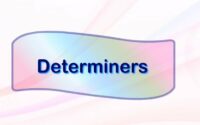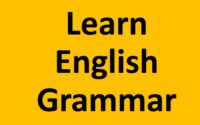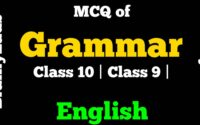Common Errors in English | English Grammar | BrainyLads |
Table of Contents
Common Errors in English, Grammatical Errors
Writing perfect English has always been a challenge for students. It is often seen that they commit a lot of errors while writing English during various competitive exams held at both state and center level. To help them sort out this problem, we have brought to you some common errors made by them in their tests. Have a look at some of them.
ADVISE Vs. ADVICE
(1) Advise is a verb whereas Advice is a noun.
(2) Advise can be used as second, third form (Advised/Advised) and as present participle (Advising) whereas Advice can not be used in any of these case except as a noun.
For Example :
- My mother advised me to go there. (Right)
- My mother adviced me to go there. (Wrong)
- They are advising me to leave alcohol. (Right)
- They are advicing me to leave alcohol. (Wrong)
WORSEN Vs. WORSE
(1) WORSEN is a verb whereas WORSE is both a noun & adjective.
(2) WORSEN can be used as second, third form (Worsened, Worsened) and as present participle (Worsening) where WORSE can not be used in any of these case except as a noun or adjective.
For Example :
- I will worsen your condition coming year. (Right)
- I will worse your condition coming year. (Wrong)
- His condition is worse than that of Ram. (Right)
- His condition is worsen than that of Ram. (Wrong)
Related
BESIDE Vs. BESIDES
(1) Beside is a preposition whereas Besides is both a preposition & adverb.
(2) Beside means ‘Near’ whereas Besides means ‘In addition to this’
For Example :
- My mother was sitting beside me. (Right) (Hint: Here beside means near)
- My mother was sitting besides me. (Wrong)
- I can eat anything besides non vegetarian food. (Right)
- I can eat anything beside non vegetarian food. (Wrong)
IN SPITE OF Vs. DESPITE
(1) Both are prepositions and same in meaning but different in appearance.
(2) ‘In spite’ is followed by ‘Of’ means whereas Despite is never followed by ‘Of’.
For Example :
- My father used to put up with me in spite of my harsh behaviour. (Right)
- My father used to put up with me despite of my harsh behaviour. (Wrong)
- He tortured her despite her ill health. (Right)
- He tortured her despite of her ill health. (Wrong)
BATHE Vs. BATH
(1) Bathe is a verb whereas Bath is a noun.
(2) Bathe can be used as verb’s second and third form (bathed) but Bath can not be used as second and third form.
For Example :
- Why don’t you bathe in the evening? (Right)
- Why don’t you bath in the evening? (Wrong)
OF Vs. OFF
(1) Both OF and OFF are prepositions but they differ in their meanings.
(2) OF shows link and connect between the subject and the object whereas OFF shows disconnect between the subject and the object.
For Example :
- The boy who is standing in the kitchen is the brother of Joseph. (Right)
- The boy who is standing in the kitchen is the brother off Joseph. (Wrong)
- Tushar fell off the horse. (Right)
- Tushar fell of the horse. (Wrong)
BETWEEN Vs. AMONG
(1) Both Between and Among are prepositions but they differ in their meaning.
(2)Between is used for two people or things whereas Among is used for more than two people or things.
For Example :
- The Principal distributed the sweets between Rahul and Pankaj. (Right)
- The Principal distributed the sweets among Rahul and Pankaj. (Wrong)
- That milk was shared among the students. (Right)
- That milk was shared between the students. (Wrong)
EACH OTHER VS. ONE ANOTHER
(1) Each other is used for two people or objects whereas One another is used for more that two people or objects.
For Example :
- Vipin and Kunal were talking to each other. (Right)
- Vipin and Kunal were talking to one another. (Wrong)
- All the boys of the class were fighting with one another. (Right)
- All the boys of the class were fighting with one another. (Wrong)
SLEEP VS. ASLEEP
(1) Sleep is both a verb and noun whereas Asleep is an adjective.
For Example :
- I was sleeping when my mother came. (Here sleep is used as a verb.)
- Sound sleep is good for health. (Here sleep is used as a noun.)
- My child was asleep when I reached his school. (Here sleep is used as an adjective)
VERB’S (3rd Form) VS. PAST PARTICIPLE
BROKEN Vs. BROKEN (for Example)
Never get confused between verb’s 3rd form and present participle. Although they look same but there is a difference between them. Let us have a look at the difference.
(1) Verb works as an action whereas Present Participle works as an adjective.
For Example :
- I have broken my phone by mistake. (Here broken is used as a verb)
- My friend gifted me a broken phone. (Here broken is used as an adjective)
- I swept all the rags from the floor yesterday. (Here swept is used as a verb)
- I saw an unswept statue in the desert. (Here unswept is used as an adjective)
As…As Vs. So…As
(1) Both are co-relative conjunctions but used differently.
(2.) As…as is used for the comparison to the similar thing or with the similar people whereas So…as used for comparison to dissimilar things or with dissimilar persons.
For e.g.
- Aishwarya Rai is as beautiful as rose. (Right)
- Aishwarya Rai is so beautiful as rose. (Wrong)
- Manoj is not so handsome as his brother. (Right)
- Manoj is not as handsome as his brother. (Wrong)
Agree to Vs. Agree with
(1.) Agree to is used when one agrees to a statement whereas Agree with is used when one agrees with a person.
For e.g.
- The Principal agreed to my words. (Right)
- The Principal agreed with my words. (Wrong)
- Do you agree to this statement? (Right)
- Do you agree with this statement? (Wrong)
- My father agreed with me. (Right)
- My father agreed to me. (Wrong)
Made of Vs. Made from
(1) Made of is used when we can see the thing which is being talked about whereas made from is used when we can’t see the thing which is being talked about.
For e.g.
- This wall is made of bricks. (Right)
(Hint: Bricks are visible here therefore Made of has been used here.)
- This paper is made from wood. (Right)
(Hint: Since wood is not visible in the paper therefore Made from has been used here)
Color Vs. Colour
(1) Color is an American word whereas Colour is a british word. Both are used as nouns,
For e.g.
- What is the color of your t-shirt? (American English)
- What is the colour of your t-shirt? (British English)
There Vs. Their
(1) There is used for location, place or direction whereas Their is used for possession.
For e.g.
- There is a lot of crowd in the market. (Right)
- Their is a lot of crowd in the market. (Wrong)
- They have done their work. (Right)
- They have done there work. (Wrong)
- All the people of this world prefer their wealth to health. (Right)
- All the people of this world prefer there wealth to health. (Wrong)
Put up Vs. Put up with
(1) Both are phrasal verbs but both mean differently.
(2) Put up has many meanings such as; ‘to post, to offer, to erect’ etc. whereas Put up with means ‘to tolerate’
For e.g.
- Why don’t you put up that notice on the notice board. (Right)
- Why don’t you put up with that notice on the notice board. (Wrong)
- She is putting up with the behaviour of her husband. (Right)
- She is putting up the behaviour of her husband. (Wrong)
Little Vs. Few
(1) Both are determiners (adjectives).
(2) Little is used for quantity (uncountable) whereas Few is used for numbers (countable)
For e.g.
- My brother bought little sugar for his family. (Right)
(Hint: Here ‘little’ is used for ‘sugar’ which is uncountable)
- My brother bought few sugar for his family. (Wrong)
- There were few students who failed in the exams. (Right)
(Hint: Here ‘few’ is used for ‘students’ which is countable)
- There were little students who failed in the exams. (Wrong)
Then Vs. Than
(1) Than is used at the time of comparison.
(2) Then means soon afterwards
For e.g.
- Ram is taller than Shyam and all other students in the class. (Right)
- Ram is taller then Shyam and all other students in the class. (Wrong)
- I went to market with my brother then we both went to Ambience Mall. (Right)
- I went to market with my brother than we both went to Ambience Mall. (Wrong)
Either Vs. Neither
(1) Either means to do or to pick one out of two.
(2) Neither means to do or to pick none out of two.
For e.g.
- My mother wanted me to select either shirt. (Means one out of two shirts)
- She ordered me to by neither shirt. (Means none out of two)
- Note: We can not use ‘not’ while making sentences with the ‘neither’
In Vs. Into
(1) Both are prepositions but convey different sense and meaning.
(2) In is used to show stability whereas into is used to show motion
For e.g.
- My mother is sitting in the drawing room. (Show stability and coverage)
- My mother ran into the room. (Shows motion)
Bid Vs. Forbid
(1) Both are verbs but mean differently.
(2) Bid is used to permit someone whereas forbid means not to allow
(3) Bid is used for affirmative (positive) sentences whereas forbid is used for negative sentences.
For e.g.
- My mother bids me to go to gym. (means she allows)
- My mother forbids me to go to gym. (means she does not allow)
Note:
Always remember that you can not use ‘not’ with forbid as it is already a negative expression.
Is to Vs. Has to
(1) Is to is used when there is no emphasis or compulsion whereas has to is used when there is emphasis as well as a lot of compulsion.
For e.g.
- She is to attend my brother’s marriage next week. (Speaker is normal here while speaking. There is no compulsion).
- She has to attend my brother’s marriage next week. (It seems mandatory for the speaker to attend the marriage).
Which Vs. That
Which is used for non essential or Restrictive clause whereas That is used for essential or nor restrictive clause.
For e.g.
- I have a car, which is parked, in the garage. (Non Essential and Non Restrictive Clause)
Note: Here we can make this sentence without which clause as well.
- I have a car that is parked in the garage. (Essential and Restrictive Clause)
Note: Here we can not make this sentence without that clause as well.
Its Vs. It’s
Its is used as a possessive whereas it’s is the contraction of It is. (short form of It is)
For e.g.
- My dog loves its puppies. (Here it is used as a possessive of It)
- It’s a well known fact that most of the people tell lies. (Here It’s means It is)
Breathe Vs. Breath
There is no major difference between breathe and breath. Former is used as a verb whereas latter is used as a noun.
For e.g.
- It is difficult to breathe in this poisonous environment. (Here the word breathe has been used as a verb)
- All you need to do is to control your breath. (Here the word breath has been used as a noun)
Former Vs. Latter
Former is used for the first person or a thing in a sentence whereas Latter is used for the second person or thing in a sentence.
For e.g.
- I met Ram and Shyam in the market. Former is a Chartered Accountant (Ram) whereas latter is a driver (Shyam)
- Derry and Mr. Lamb were different from each other. Former (Derry) was a pessimistic whereas latter (Mr. Lamb) was an optimistic person.
# Common Errors in English
# Common Errors in English Grammar
# Common Errors in English For SSC
# Common Errors in English Grammar Exercises
For practice and Exercises : Click Here
Do share this post if you liked this post of common errors in English. For more updates, keep logging on Brainylads


